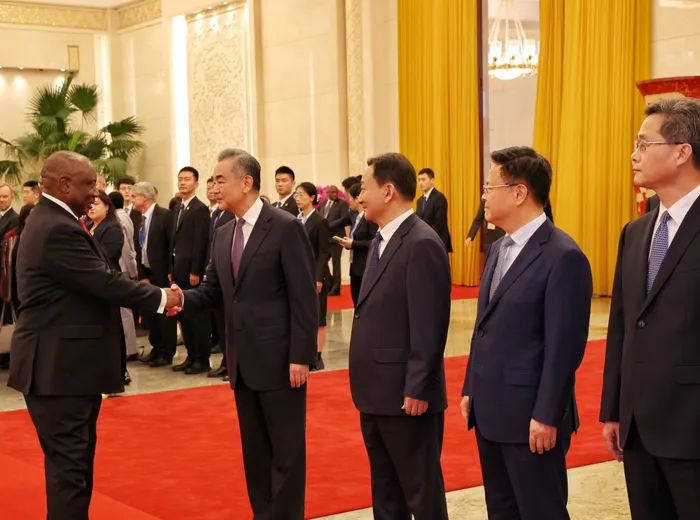Economic co-operation is the bond that binds Africa and China

President Cyril Ramaphosa greets Chinese ministers during his state visit on September 3, to China ahead of the 2024 FOCAC annual meeting in Beijing. Initiatives under the FOCAC framework have shown that platforms promoting South-South co-operation can deliver substantial outcomes, the writer says. – Picture: GCIS
By Busani Ngcaweni
The Forum on China-Africa Co-operation (FOCAC) summit has triggered a wave of optimism and anticipation. Stakeholders from both continents expect this gathering to foster meaningful dialogue and forge partnerships that are not only positive in spirit but also results-driven.
Past initiatives under the FOCAC framework have shown that platforms promoting South-South co-operation can deliver substantial outcomes. This article examines these ongoing projects and investments, underscoring the importance of Africa asserting itself in these collaborations by setting clear conditions and prioritising projects that enhance the socio-economic wellbeing of its people in a sustainable way.
The global development and South-South Co-operation Fund has been a significant tool in advancing development initiatives across Africa and other developing regions. Recently, the fund was increased by US$1 billion, bringing the total to US$4 billion.
This increase aims to boost multilateral co-operation in critical areas such as poverty reduction, public health, human resource development, food security, digital connectivity, and green development. These projects, often described as “small but beautiful”, have a substantial impact on local communities.
While the fund is primarily aid-based and focuses on specific anti-poverty projects like the global development initiative, it is crucial for African countries to engage actively and set clear, strict conditions for such partnerships. This approach ensures that the projects align with their national interests and contribute to their socio-economic goals.
Under the trade promotion project, one of the nine key programs, 16 agricultural products from 11 African countries have been granted access to the Chinese market through the “Green Channel”. Additionally, 21 African countries have benefited from zero-tariff treatment on 98% of their exports to China.
While these trade opportunities can significantly boost African economies, it is essential that African nations prioritise projects that promote sustainable development and improve the socio-economic wellbeing of their people.
In terms of investment, China has increased its direct investment in Africa by more than US$5 billion through the investment-driven project. China has also provided over US$4 billion in credit lines to African financial institutions.
The establishment of the China-Africa private investment promotion platform and the China-Africa cross-border RMB Centre reflects the deepening financial ties between the two regions.
However, to ensure these investments are beneficial in the long term, African countries must establish stringent conditions that guarantee sustainable development and equitable benefits for their citizens.
The ‘Future Africa-China Vocational Education Co-operation Plan’ under the capacity-building project has also made significant strides. Fourteen vocational colleges across seven Chinese provinces have partnered with 13 colleges in 11 African countries.
In 2022, these educational and labour co-operation initiatives created nearly 300,000 jobs across Africa. While these efforts are commendable, it is vital for African nations to ensure that such programmes align with their development priorities and deliver lasting, positive impacts.
The Green Development Project has led to the establishment of the China-Africa Geo-Science Co-operation Centre and the launch of the China-Africa Green Innovation program. Notable renewable energy projects led by Chinese companies, such as the Zongailu Hydropower Station in Nigeria and the Sakai photovoltaic plant in Central Africa, are progressing well.
For these projects to genuinely benefit African countries, it is crucial that they set strict conditions to ensure these initiatives contribute to sustainable development and provide tangible benefits to local communities.
China has also been active in reducing poverty and supporting agriculture through various initiatives. This includes providing food aid to African countries in need and establishing 13 demonstration villages for agricultural development and poverty reduction in Central Africa.
Additionally, China has promoted hundreds of social responsibility projects in 44 African countries through the Non-Corporate Social Responsibility Alliance. These initiatives must be carefully monitored to ensure they genuinely serve the interests of African people and foster sustainable development.
Liu Junfeng, Deputy Director-General of the National Agency for International Development Co-operation, stated that all assistance and development co-operation projects under the “Nine Projects” have been implemented, contributing positively to Africa’s economic and social development.
He emphasised that the outcomes of China-Africa co-operation have been tangible and beneficial to both parties. However, it is imperative for African countries to engage strategically, setting clear conditions to ensure that all projects align with their socio-economic priorities and adhere to sustainable practices.
Over the past three years, Chinese companies have created over 1.1 million local jobs in Africa. The economic and trade co-operation zones established through these investments cover sectors such as agriculture, processing and manufacturing, commerce, trade, and logistics, attracting more than 1,000 enterprises.
These zones have significantly contributed to local tax revenue and foreign exchange earnings through exports. To maximise these benefits, African nations must assert themselves by setting clear conditions for these partnerships, ensuring that the projects align with their long-term development goals and are sustainable.
By setting stringent conditions for co-operation, prioritising projects that enhance socio-economic wellbeing, and insisting on sustainability, Africa can ensure that its partnerships with China and other nations truly serve the interests of its people and contribute to the continent’s long-term prosperity.
* Busani Ngcaweni is Director-General of the National School of Government in South Africa and research associate in world economics at the University of the Chinese Academy of Social Sciences. He writes in his personal capacity
** The views expressed in this article do not necessarily reflect the views of The African